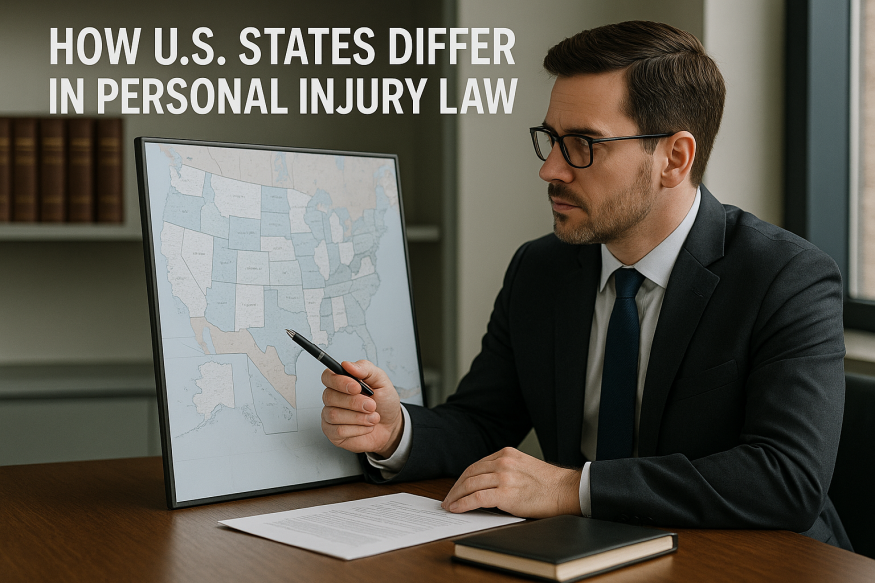How U.S. States Differ in Personal Injury Law

Let's get something straight: if you're hurt in an accident, the clock starts ticking—and depending on what U.S. state you're in, the rules around suing, deadlines, and how much money you can recover are completely different.
Sounds confusing? You're not alone. And for the Latino community, these differences can turn an already stressful moment into a legal minefield. Between language barriers, immigration worries, and unfamiliar systems, many injured Latinos never file a claim—even when they're entitled to compensation.
It's time to fix that.
Below, we break down how personal injury laws differ in Florida, Texas, and New York, and why knowing your state's rules could make or break your case.
Florida: Shorter Deadlines, Stricter Rules
If you were injured in Florida, you need to move fast.
In March 2023, lawmakers passed House Bill 837, and it cut the statute of limitations for negligence claims in half—from four years down to just two. That means you've got 24 months from the day of your accident to file your case. Miss it? You're out of luck.
But there's more:
- Florida also adopted a modified comparative negligence system.
- If you're more than 50% at fault, you can't recover a dime—even if someone else played a role.
And if your accident involved a government agency—say you slipped in a public building—you'll face strict sovereign immunity laws that limit how much you can sue for, and who you can hold accountable.
Takeaway for Florida residents: Don't wait. Review your options now and check this personal injury settlement legal guide to understand how compensation works, including what you might receive for pain and suffering, lost wages, and medical bills.
Texas: Red Tape and Tight Windows
They say everything's bigger in Texas—including the legal hurdles.
While the state gives you two years to file a personal injury lawsuit (just like Florida), things get tricky if the government is involved. If your injury came from a city bus, a public school, or a county-owned building, you may need to:
- Submit a formal notice of claim within six months.
- File that notice before even suing.
Otherwise, your case might get tossed out before it even gets started.
In 2025, Texas legislators introduced House Bill 4806—a proposal to cap "pain and suffering" damages. It didn't pass (yet), but it's a red flag. Texas may soon limit what victims can recover, especially in emotionally devastating cases.
Texas isn't the friendliest place for personal injury claims, especially if you're dealing with public institutions. Stay ahead of any future changes and talk to an attorney ASAP if you think you have a case.
New York: More Time, Fewer Limits
Here's some good news: if you're injured in New York, you've got time.
The state offers one of the most generous timelines—three full years to file a personal injury lawsuit. That's longer than most states.
And here's what sets New York apart:
- No cap on damages. A jury can award you the full amount for lost income, emotional trauma, and pain and suffering.
- But if the case involves a public agency, you must still file a Notice of Claim within 90 days, so don't wait too long.
Curious about the specifics? You can read NYS Civil Practice Law & Rules §214 to see how the statute of limitations varies by claim type.
For Latino Families, the Barriers Are Real
Let's speak the truth: the legal system isn't built with Latinos in mind.
Whether it's fear of deportation, a lack of bilingual attorneys, or cultural beliefs that lawsuits are "taboo," many families stay quiet after an accident—even when they've done nothing wrong.
And in states like Florida or Texas, staying quiet costs you. A missed deadline or misunderstood requirement could destroy your case before it begins.
What makes this worse? Many Latinos come from countries where suing isn't common or is seen as shameful. But in the U.S., it's not about revenge—it's about justice. It's about covering your bills, healing your body, and rebuilding your life.
That's why legal education, Spanish-speaking outreach, and trusted local firms matter more than ever.
The Final Word: Don't Let State Laws Silence You
Here's the hard truth: your legal rights depend on your ZIP code. The same injury in Texas, Florida, or New York can lead to totally different outcomes.
So what can you do?
- Know your deadlines.
- Understand your rights.
- Get help from a lawyer who speaks your language—and fights like hell for your future.
If you've been injured, don't wait and don't guess. Because when it comes to justice, what you don't know can hurt you.
Subscribe to Latin Post!
Sign up for our free newsletter for the Latest coverage!
© 2026 Latin Post. All rights reserved. Do not reproduce without permission.














